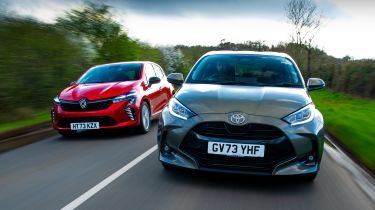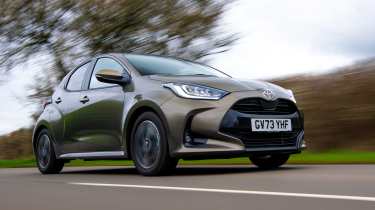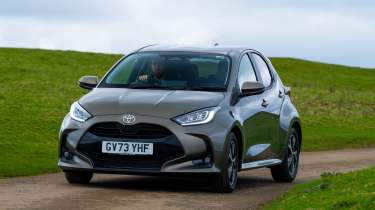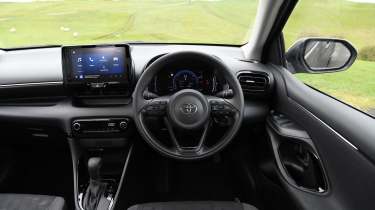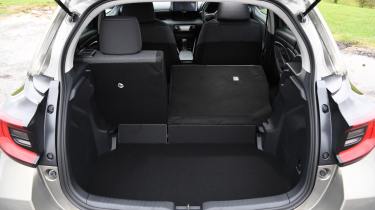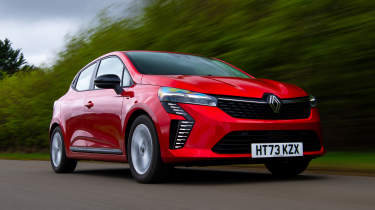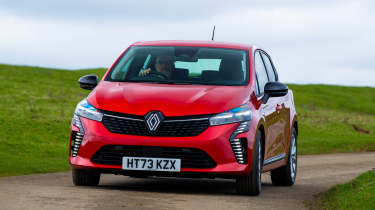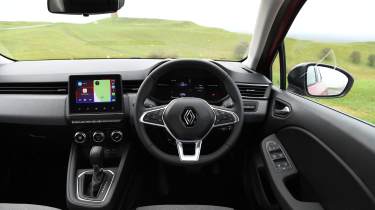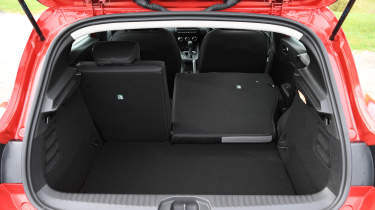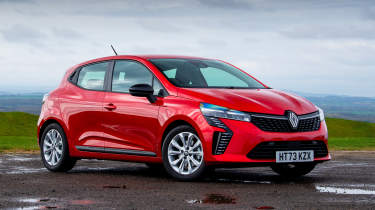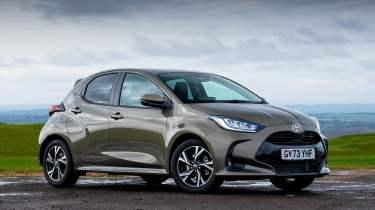Toyota Yaris vs Renault Clio 2024 twin test: hybrid supermini battle
With more and more electrified rivals arriving, Toyota has given its hybrid-only Yaris a facelift. We put it up against Renault’s class-leading Clio.
There are plenty of reasons why buyers aren’t making the switch to electric cars – high list prices, concerns about driving range, and the ability to charge up being the main ones – but electrification is also finding its way into more ‘transitional’ petrol-powered machines in the form of hybrid tech.
One pioneer in the field is Toyota, and the Yaris supermini offers petrol-electric power in a compact package. The Japanese company has just updated the car with the addition of a more powerful drivetrain, improved cabin tech and more safety kit, so what better way to see how it fares than to put it to the test?
While the Yaris has been sold exclusively as a hybrid for a while, one model that embraced the tech more recently is the Renault Clio. It won three Best Supermini titles at our New Car Awards between 2020 and 2022, and Renault’s E-Tech system helped secure those victories with its impressive mix of performance and economy. Is it still the hybrid to go for? Or is the revised Yaris enough of an improvement to put it back on top of the hybrid-supermini pile?
| Toyota Yaris 1.5 VVT-i Design | Renault Clio E-Tech 145 Evolution | |
| Price: | £23,535 | £21,295 |
| Powertrain: | 1.5-litre 3cyl petrol hybrid, 114bhp | 1.6-litre 4cyl petrol hybrid, 141bhp |
| 0-62mph: | 9.7 seconds | 9.3 seconds |
| Efficiency: | 56.2mpg/12.4mpl | 58.5mpg/12.9mpl |
| Official CO2 | 92g/km | 96g/km |
| Annual VED: | £170 | £170 |
Toyota Yaris
The current Yaris was launched in the UK in 2020, and this mid-life update adds the option of a more powerful hybrid powertrain, uprated infotainment and additional safety kit. The range starts at £22,630, but we’re testing the next rung on the ladder here with the £23,535 Design model.
Tech highlights
As with the pre-facelift Yaris, the new model is offered exclusively as a petrol-electric hybrid. It features a three-cylinder naturally aspirated combustion engine with variable valve timing, along with a modest 0.76kWh battery that powers the electric motor.
Used - available now

2022 Kia
e-Niro
33,290 milesAutomaticElectric
Cash £20,197
2021 BMW
1 Series
60,610 milesAutomaticPetrol1.5L
Cash £17,697
2014 BMW
1 Series
130,000 milesManualDiesel2.0L
Cash £4,498
2014 Ford
C-Max
39,000 milesManualPetrol1.0L
Cash £4,898Drive is sent to the front wheels via an e-CVT automatic gearbox, which manages the power split between the two sources, as well as energy recovery back into the battery when the Yaris is coasting or braking. It’s a well resolved system that doesn’t require any special driving techniques to make the most of the fuel economy that’s possible.
As well as offering a more powerful hybrid system, Toyota has refined the 114bhp powertrain we’re trying here to make it more efficient. Official combined fuel economy stands at 70.6mpg, which is 1.7mpg better than before. If you choose the 129bhp set-up, official economy is still 67.3mpg.
Safety: All versions of the Yaris come with upgraded Toyota Safety Sense software. A new front camera and radar sensors can scan further ahead and recognise a wider range of objects (including motorcycles for the first time), while acceleration suppression intervenes if it senses sudden use of the throttle and there’s a risk of a forward collision. Protective Driving Assist helps with slowing the Yaris, while the Emergency Driving Stop System can assist if the driver becomes incapacitated.
On the road
The Yaris is a great urban runabout, although it doesn’t feel out of its depth on faster roads either.
Around town: This is where the Yaris is at its best, thanks to its compact dimensions, light controls and decent all-round visibility. The rear C-pillars are on the thick side, so over-the-shoulder vision is slightly impaired, but there’s a rear camera to help with reversing.
The hybrid system defaults to electric drive as often as possible, and one of the car’s trip displays shows how often the Yaris runs in electric mode during each drive. The petrol engine fires up whenever you accelerate, and it’s quite vocal when it does, although the three-cylinder thrum sounds quite sporty. As ever with Toyota’s hybrid system, the engine revs rise faster than your road speed because the e-CVT gearbox manages the power provided by the engine and electric motor, but acceleration is smooth.
A & B-roads: At higher speeds the Yaris’s nimble chassis shines through. The steering remains light but the car feels agile, while the suspension is on the firm side, so body roll is kept in check. That does mean bumps can be felt in the cabin, although the suspension doesn’t crash.
There’s more engine noise the faster you go, with an even greater disconnect between your speed and the revs coming from under the bonnet. The Yaris still tries to use electric drive as much as possible, though.
Motorway: At the national limit, the engine becomes quite revvy, because the Toyota’s hybrid powertrain relies on the petrol powerplant above 60mph. It’s not too intrusive, though, and road noise from the tyres is just as noticeable.
Ownership
Smaller exterior dimensions than the Renault’s mean there’s less space in the Yaris’s cabin, and this mid-life update hasn’t improved matters. There’s plenty of adjustment to get comfortable behind the wheel, though, including seat height and steering-wheel reach and rake. The fabric trim on the seats feels hard-wearing, while the seats themselves are comfortable for longer trips.
Cabin quality is good, but there is a lot of black plastic on show. The dashtop and centre armrest feature squishy rubberised material, while the plastics around the touchscreen, climate controls and centre console are of a harder consistency. Low down on the doors, the plastics are harder still, so they should stand up to knocks and scrapes easily.
Both Toyota and Renault offer three-year/60,000-mile warranty cover, but if you have the Yaris serviced at a Toyota franchise, you can extend this cover by 12 months each time to a maximum of 10 years or 100,000 miles, whichever comes first. Even if you miss a dealer visit, as long as the car is within the 10-year/100,000-mile window, then it’s still eligible for the 12-month warranty.
Not that there is likely to be much need to use the warranty in the first place. Toyota has a strong reputation for reliability, although Renault is much better than it used to be in this regard.
Storage: The compact Yaris cabin has to make sacrifices in terms of storage space. Up front, the door bins are small, and access to them is restricted by the heavily sculpted door pull above. In the back, there’s only room for a cup-holder in each rear door.
The central armrest lifts to reveal a shallow tray underneath, which is only deep enough for a smartphone, while below it is a sunken tray with two cup-holders moulded into it. These are deep enough so that bottles can be stored with the centre armrest in place.
Practicality
Space in the back is at a premium, while cargo carrying isn’t a strong point.
Rear space: Once past the narrow back doors, the Yaris feels cramped inside, especially if taller passengers are sitting up front. Kneeroom is tight, but the height-adjustable front seats at least mean there’s foot space for two passengers.
There is a third seatbelt offered, but the central seat is very narrow and legroom is limited by the protruding centre console ahead. There’s no cabin lighting in the back of the Yaris, but then, the Clio doesn’t have illumination in the rear, either.
Boot: The load lip on the Yaris is low to the ground, but there’s a bit of a drop inside to lift items over. Toyota quotes a capacity of 286 litres, which compares with 301 litres in the Clio, while the small floor area and tall, narrow shape of the space will limit how much can be carried.
What to buy?
Which version we’d choose…
- Powertrains: The major update to the Yaris range is the addition of the more powerful hybrid system. This has the same 90bhp engine as the standard version, but adds a punchier electric motor for a combined output of 129bhp.
- Trim: Icon spec kicks off the range, while Design is £905 extra on top of the base price. Excel is a significant £3,165 more than Design, but features all of the Yaris’s updates. If you want the more powerful engine, then it’s the only engine option available for the GR Sport and Premiere Edition trims, which cost £28,805 and £28,925 respectively.
- Our choice: The 114bhp powertrain is good enough, while Excel spec features the new tech.
Renault Clio
The Clio offers a strong mix of talents, with a good-quality cabin, decent handling and lots of kit for a competitive price. We’re pitching the entry-level Evolution model, which starts from £21,295 in hybrid guise, against the Yaris.
Tech highlights
While Renault was a little late to the hybrid party when compared with Toyota, the tech used in the Clio offers more power but with similar efficiency. The system is based around a 1.6-litre four-cylinder petrol unit, but it features two electric motors and a larger 1.2kWh battery. This combination is rated at 141bhp, a healthy 27bhp more than the Yaris we’re testing, and 12bhp ahead of the more powerful drivetrain that’s now offered in the Toyota.
Renault claims combined fuel economy of 67.3mpg on the WLTP test, which is a touch behind the 70.6mpg quoted for the Yaris, but during our time with both cars, it was the Clio that offered better returns. It managed 58.5mpg compared with 56.2mpg for the Yaris, and while these figures are a little way behind the official claims for both cars, we did cover a number of motorway miles in them. That would have been to the benefit of the more powerful Clio, while the lighter Yaris is likely to be better in urban driving.
Safety: The Clio earned a five-star Euro NCAP rating in 2019, while the Yaris achieved the maximum in 2020, although its percentage scores for adult and child occupant protection were lower. Standard safety kit on the Renault includes lane-keep and departure warning, traffic-sign recognition and active braking with pedestrian and cyclist detection. While the Toyota’s system is slightly more advanced (with motorcycle detection), lane-departure warning is an option on the Design trim level.
On the road
Fantastic all-round ability means that the Clio is a class leader for driving comfort and enjoyment.
Around town: While the Clio is larger than the Yaris, it’s no harder to manoeuvre at low speeds, plus it has a smaller turning circle that enhances its ability in town. The hybrid system is quiet and refined, too, with the car’s four-cylinder engine proving quieter than the Toyota’s.
One aspect that boosts the Clio’s refinement is the fact that the electric motors do more of the work when accelerating. Where the engine in the Toyota fires up and starts revving straight away, the Renault sprints off the line in all-electric mode while the engine fires up, so it feels more refined and responsive, thanks to the instant power delivery that the motors offer. Once you’re moving, the car’s electronics do their best to keep the Renault running on electricity as much as possible, further boosting refinement.
A & B-roads: From a standing start, the Clio’s quick initial acceleration tails off while the Yaris continues to build speed, so despite the Renault having a power advantage over its rival, it’s only 0.4 seconds faster from 0-62mph, at 9.3 seconds.
Softer suspension means that the Clio is more comfortable than its Japanese competitor on bumpy roads, but this doesn’t come at the expense of an enjoyable drive, with minimal body roll and well weighted steering offering engaging handling at higher speeds.
Motorway: Softer suspension means the Clio is more comfortable at a high-speed cruise than the Yaris, too. Where the Toyota thumps and shakes over cat’s eyes or other imperfections, the Renault makes them heard, but not felt, by occupants.
Ownership
Step into the Clio after the Yaris and not only do you get a greater sense of space, but the cabin also feels brighter, courtesy of the materials used. The seats are finished in grey fabric, while the texture of the cushions feels like neoprene, which is a by-product of the upholstery featuring 60 per cent recycled materials. There’s also a strip of light-grey trim covering the full width of the dash that has the look of fabric, but feels like rubberised plastic to the touch. In contrast, the doors are finished in a uniform hard black plastic, which is also used for the centre console between the two front seats.
Overall build quality feels good, and the central touchscreen is within easy reach of the steering wheel, although the multifunction controls mean you don’t necessarily need to use the screen all of the time. We also like the bank of toggle switches that run across the bottom of the screen, although these don’t quite have the same solid feel as some of the other controls. One particular highlight is the climate-control system. It features three large rotary knobs that are a doddle to use when you’re on the move, while the metal bezels add another upmarket touch to the Clio’s interior.
While Renault can’t match Toyota’s potentially decade-long warranty cover, it offers a more cost-effective service plan. Three years of maintenance is available for £17.99 a month, which is around £10 a month less than Toyota’s servicing deal.
Storage: Larger overall dimensions mean that the Clio has more useful storage than the Yaris. The central armrest has a bin beneath it, while a tray ahead of the drive selector offers space for phone storage, plus two USB sockets for charging.
The glovebox goes back a long way and while space is compromised slightly by the fuses that are also located there, the compromise isn’t as bad as in some rivals. The front door bins are long and narrow, while the rear’s are short and shallow.
Practicality
Larger exterior dimensions mean the Clio has the measure of its rival inside.
Rear space: Look at the tale of the tape and our measurements reveal that the Yaris and Clio are surprisingly similar in terms of back-seat dimensions. The Renault has more headroom, but the Yaris has a wider range of legroom, while deeper cutouts in the doors mean it offers more elbow room. But the Clio has better foot space under the front seats, and the soft fabric seatbacks mean there’s better space for knees, while the longer seat bases give better support. The middle seat benefits from minimal transmission tunnel intrusion, too.
Boot: Where the Clio steals a march is for boot space, with a larger floor area and greater overall volume, whether the seats are up or down. But the Renault’s load lip is a bit higher, both outside and inside.
What to buy?
Which version we’d choose…
- Powertrains: There are two engine options offered in the Clio, an 89bhp TCe 90 turbo petrol three-cylinder and the 141bhp hybrid model tested here. Both engines are available across the range, with a £3,500 premium if you choose the hybrid over the petrol.
- Trim: The model range is nearly as simple as the engine line-up, with Evolution, Techno and Esprit Alpine offered. Pay an extra £1,400 for Techno trim and a reversing camera and front parking sensors are added, while another £1,400 for the top spec adds adaptive cruise and a bigger touchscreen.
- Our choice: You won’t feel short changed if you choose the base Evolution spec.
Results
Which car comes out on top?
Winner: Renault Clio
With its combination of decent space, good ride comfort, agile handling and value for money, the Renault Clio remains an excellent all-rounder that’s difficult to beat in the supermini sector.
The most recent updates have done nothing to detract from its talents, while the hybrid system feels better calibrated and more sophisticated than Toyota’s tried-and-tested set-up. Combine this with an interior that looks and feels more upmarket than the Clio’s price suggests, and it’s a winner.
| Pros | Cons |
| Great value for money | Infotainment shows its age |
| Effective hybrid system | High boot lip |
| Decent cabin quality | Shorter warranty than Toyota |
| Boot and passenger space | Flimsy switchgear in places |
Runner up: Toyota Yaris
There’s plenty to like about the Yaris, and the updates have helped to enhance the Toyota’s appeal. Unfortunately the Clio is just too good a rival for it to win here.
If you only need back seats for occasional use, then the Toyota is perfectly fine, while the hybrid system is effective, especially at low speeds. The Yaris has sweet handling and is more fun to drive than you might expect. But the Clio is more competitively priced and the more powerful Yaris is dearer still.
| Pros | Cons |
| Manoeuvrable around town | Pricier than the Clio |
| Good all-round visibility | Small boot |
| Nimble chassis | Tighter rear cabin |
| Urban fuel economy | Noisy engine when extended |
Rivals and other options
The Clio wins our test, but what else is out there?
- Same class: Skoda Fabia
- Same money: Mazda 2 Hybrid
- Used: Toyota Corolla
- Used: MINI Cooper
- Coming soon: Suzuki Swift
The great debate
The Auto Express team have their say…
John McIlroy, editor-at-large: “The more powerful Yaris has been introduced to meet demand, but it doesn’t seem like a necessary upgrade if you’re going to be driving around town most of the time. The extra grunt will help on the motorway, but it seems like an expensive upgrade.”
Richard Ingram, deputy editor: “Renault needs to go all the way and add a flagship Alpine hot hatch to the Clio line-up. Toyota has proved there’s demand for such models with its GR Yaris, and some of that car’s star quality rubs off onto the standard range. Renault could even hark back to its Clio Cup machinery.”
Dawn Grant, picture editor: “The Clio in our pictures is the car I’m currently running on our long-term test fleet, and I can confirm that it’s pretty accomplished on longer runs. The Renault is smooth and quiet at motorway speeds, while the fuel economy has been impressive, even when it’s full of passengers and luggage.”
Steve Fowler, editor-in-chief: “It seems as if the world is finally catching up with Toyota and its hybrid-drive technology. More importantly, buyers are ready to embrace the tech. It’s a more cost-effective way of reducing emissions than an EV, while retaining the kind of driving ranges that buyers are used to.”
Alex Ingram, chief reviewer: “If you’re willing to go pure electric, then the Renault Zoe offers the same kind of all-round ability as the Clio. It’s been around for a while, but updates to the Clio have filtered across, while a claimed range of around 240 miles will be enough for most needs.”
Which would you buy? Let us know in the comments section below…
Specs and prices:
| Toyota Yaris 1.5 VVT-i Design | Renault Clio E-Tech 145 Evolution | |
| On the road price/total as tested: | £23,535/£24,150 | £21,295/£21,995 |
| Residual value (after 3yrs/36,000): | £12,567 (53.4%) | £11,393 (53.5%) |
| Depreciation: | £10,968 | £9,902 |
| Annual tax liability std/higher rate: | £1,075/£2,150 | £1,013/£2026 |
| Annual fuel cost (10k/20k miles): | £1,410/£2,820 | £1,355/£2,710 |
| Ins. group/quote/VED: | 14/£1,439/£170 | 15/£1,071/£170 |
| Service costs: | £336 | £216 |
| Powertrain: | 3cyl in-line petrol hybrid/1,490cc | 4cyl in-line petrol hybrid/1,598cc |
| Power/torque: | 114bhp/120Nm | 141bhp/144Nm |
| Transmission: | e-CVT auto/fwd | 6-spd auto/fwd |
| Fuel tank capacity/ battery size: | 36 litres | 39 litres |
| Length/wheelbase: | 3,940/2,560mm | 4,053/2,583mm |
| Height/width: | 1,500/1,745mm | 1,440/1,798mm |
| Boot capacity (seats up / down): | 286/947 litres | 301/1,006 litres |
| Kerbweight/payload/towing weight: | 1,085/530/450kg | 1,323/435/900kg |
| Turning circle/spare wheel: | 11.0 metres/repair kit | 10.4 metres/£300 |
| Basic warranty (miles)/recovery: | 3yrs (60,000)/1yr | 3yrs (60,000)/3yrs |
| Driver Power manufacturer position: | 12th | 29th |
| Euro NCAP: Adult / child / ped. / assist / stars: | 86/81/78/85/5 (2020) | 96/89/72/75/5 (2019) |
| 0-62mph / top speed: | 9.7 seconds/109mph | 9.3 seconds/112mph |
| Auto Express economy/range: | 56.2mpg/445 miles | 58.5mpg/502 miles |
| WLTP combined: | 70.6mpg/15.5mpl | 67.3mpg/14.8mpl |
| Actual/claimed CO2/tax bracket: | 116/91g/km/23% | 112/96g/km/24% |
| Number of airbags / Isofix points: | Nine/two | Seven/three |
| Parking sensors/camera: | £600 safety pack/yes | Rear/no |
| Lane-keep assist / blindspot / AEB: | Yes/£600 safety pack/yes | Yes/no/yes |
| Climate control/adaptive cruise ctrl: | Yes/yes | Yes/no |
| Leather / heated seats / wheel: | No/no | No/no |
| Metallic paint/LED lights: | £615/yes | £600/yes |
| Keyless entry & go/powered tailgate: | No/no | Yes/no |
| Sat-nav/digital dashboard/USBs: | No/yes/two | Yes/yes/two |
| Online services/wireless charging: | No/no | Yes/no |
| Apple CarPlay/Android Auto: | Wireless/wireless | Yes/yes |

